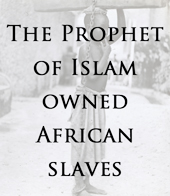TheReligionofPeace
|
|
TROP is a non-political, fact-based site which examines
the ideological threat that Islam poses to human dignity and freedom
|
|
|
Jihad Report
Dec 13, 2025 -
Dec 19, 2025
|
| Attacks |
28
|
| Killed |
89
|
| Injured |
115
|
| Suicide Blasts |
2
|
| Countries |
8
|
|

|
Jihad Report
November, 2025
|
| Attacks |
106
|
| Killed |
435
|
| Injured |
219
|
| Suicide Blasts |
4
|
| Countries |
18
|
|
List of Attacks
|
|
|
It's much easier to act as if critics of Islam have a problem with Muslims as people than
it is to accept the uncomfortable truth that Islam is different
|
|
|
|

|

|
|
|

What can we learn about
Islam from this woman?
|
|
|
|





